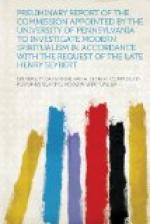Of these phenomena themselves, verification is, at this late date, manifestly out of the question. The only published accounts are those made by Zoellner, and in the absence of notes made at the time, all descriptions of phenomena given now by the other persons present would be valueless, except as indicating the impression made upon them at the time by the occurrences.
But, though the phenomena themselves cannot be satisfactorily sifted, the men who were engaged in the investigation are, with the exception of Zoellner himself, still living, and it occurred to me when in Germany during the past summer, that a conference with each of these men, and an inquiry into their qualifications for making such an investigation into the phenomena of Spiritism, might be of no small value. These men are: William Wundt, Professor of Philosophy in the University of Leipsic; Gustav Theodore Fechner, now Professor Emeritus of Physics in the University of Leipsic; W. Scheibner, Professor of Mathematics in the University of Leipsic; and Wilhelm Weber, Professor Emeritus of Physics in the University of Goettingen—all of them men of eminence in their respective lines of scholarship.
On Saturday, June 19th, I called upon Professor Wundt at his home in Leipsic; with respect to the investigation of 1877-78 he gave me the following information, which I noted down during my conversation with him, asking him to repeat the points mentioned as I noted them, so as to avoid any error or misunderstanding, and which I copied out, with merely verbal changes, two days later.
Professor Wundt said:
1. That at the seances at which he himself was present (and he was present at two or three of them) the conditions of observation were very unsatisfactory. All hands had to be kept on the table, and no one was allowed to look under it.
2. That all that he saw done looked as if it might have been done by jugglery.
3. That the writing on slates was very suspicious—the German was bad, just such German as Slade spoke.
4. That Professor Weber, who was present at the sittings, was a very old man at the time, and presumably not an acute observer.
5. That Professor Fechner, another of those present, was afflicted with an incipient cataract, and could see very little.
6. That Professor Zoellner himself was at the time decidedly not in his right mind; his abnormal mental condition being clearly indicated in his letters and in his intercourse with his family.
7. That he (Professor Wundt) had not a high respect for the scientific judgment of Professor Ulrici, of Halle, who had been so much impressed by the report made by Professor Zoellner; Professor Ulrici he thought literary and poetical, but not scientific.
It will be seen that some of the points mentioned by Professor Wundt are suggestive; but I will postpone an examination of his statements, as of those of each of the others, until they have all been given and can be compared.




